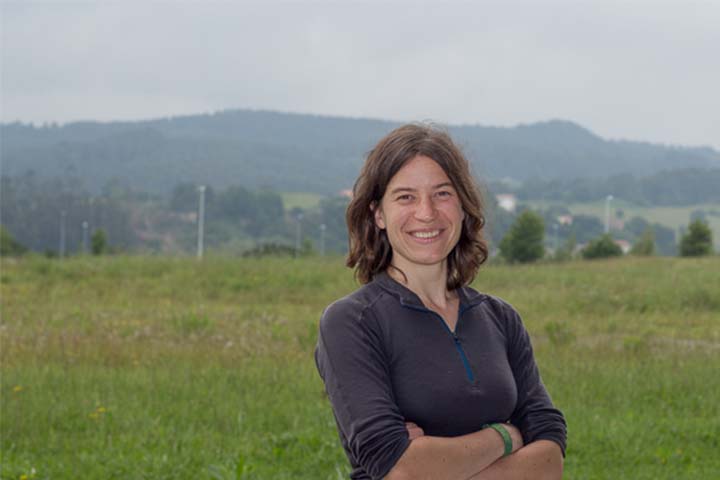- Hasiera
- Pertsonak
Lucille T. S. Chrétien

- Kargua:
Postdoctoral Researcher - Ikerketa-lerro nagusia:
Chemical ecology of plant-invertebrate interactions. - BC3 Research Line:
3. Research Line Terrestrial Ecosystems - Harremanetarako xehetasunak:
E-posta: lucille.chretien@bc3research.org
Telefonoa: +34 94 401 46 90 - Scopus Author ID: 57195626817
- ORCID ID: 0000-0002-4400-1086
Short CV
I am currently working as a postdoctoral researcher on the ERC project “Ecosystem recovery dynamics and their responses to climate change and habitat fragmentation” (RECODYN) lead by Daniel Montoya, at the Basque Centre for Climate Change (BC3) in Leioa, Spain. This project aims at understanding the ecological mechanisms underlying ecosystem recovery dynamics and how they are affected by global change. Our experimental field work takes place at the Metatron (CNRS – SETE, Moulis, France), where we monitor plant and insect communities to analyse biodiversity, community structure, and ecosystem functioning.
My research, so far, focused on chemical ecology of plant-invertebrate interactions. My interests lie in deepening our understanding of what affects such interactions, how they evolved, and the underlying morpho-chemical plant traits.
My PhD project aimed at understanding how plants in the flowering stage balance investments between defence and reproduction. I explored changes in phytohormones, and foliar and floral metabolites (primary and secondary) of attacked plants over the flowering period. Through a combination of greenhouse and field experiments, I tested how attacks impacted the plant’s interactions with its mutualists (pollinators, natural enemies), its antagonists (herbivorous insects and bacteria), and plant’s fitness parameters. I finally linked these ecological consequences of attack with the physio-chemical changes measured in the plant. This was a collaborative project between the Laboratory of Entomology, Wageningen University and Research centre (WUR) in Wageningen, The Netherlands, and at the Insect Biology Research Institute (IRBI), University François-Rabelais in Tours, France.
My first postdoctoral project then took plant defences into a broader evolutionary perspective by investigating geographical patterns in defence strategies of plants in the seedling stage. I aimed at determining whether patterns of variation in seedling resistance and tolerance corroborate established biogeographic theories about latitudinal and altitudinal variation in plant defence. I used untargeted metabolomics techniques, and correlated population- and regional-level variation in the plant metabolome to indexes measuring plant palatability, acceptability to herbivores, and tolerance to attack. This was a collaborative project between the group of Ecology and Evolution at the University of Plymouth (UoP), United-Kingdom, and the group of Molecular Interaction Ecology at the German Centre for Integrative Biodiversity Research (iDiv), Leipzig, Germany.
Affiliation previous to BC3
Chrétien L.T.S., Khalil A., Gershenzon J., Lucas-Barbosa D., Dicke M., and Giron D. (2022), Plant metabolism and defence strategies in the flowering stage: time-dependent responses of leaves and flowers under attack. Plant Cell Environ. Doi: 10.1111/pce.14363Chrétien L.T.S., van der Heide H., Greenberg L.O., Giron D., Dicke M. and Lucas-Barbosa D. (2021), Multiple attack to inflorescences of an annual plant does not interfere with the attraction of parasitoids and pollinators. J Chem Ecol. doi: 10.1007/s10886-020-01239-6
Joo Y., Goldberg J.-K., Chrétien L.T.S., Kim S.-G., Baldwin I.T., Schuman M.C. (2019), The circadian clock contributes to diurnal patterns of plant indirect defense in nature. J Integr Plant Biol. doi: 10.1111/jipb.12725
Chrétien L. T. S., David A., Daikou E., Boland W., Gershenzon J., Giron D., Dicke M. and Lucas-Barbosa D. (2018), Caterpillars induce jasmonates in flowers and alter plant responses to a second attacker. New Phytol. doi: 10.1111/nph.14904
Stam J. M., Chrétien L., Dicke M. and Poelman E. H. (2017), Response of Brassica oleracea to temporal variation in attack by two herbivores affects preference and performance of a third herbivore. Ecol Entomol, 42: 803–815. doi: 10.1111/een.12455
